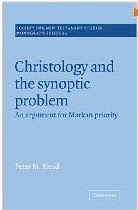Scholars have tended to take inadequate notice of the patterns of the target language when considering ancient translations. Here I give examples of where the Nestle-Aland 27th edition of the Greek New Testament wrongly attributes readings to the Syriac (Peshitta) of Matthew by assuming that the plural of the Greek word for 'bread' will be represented by a plural in Syriac. However, Syriac has a natural preference for the singular.
"Bread and the Peshitta in Matthew 16:11-12 and 12:4"
Scholars have tended to take inadequate notice of the patterns of the target language when considering ancient translations. Here I give examples of where the Nestle-Aland 27th edition of the Greek New Testament wrongly attributes readings to the Syriac (Peshitta) of Matthew by assuming that the plural of the Greek word for 'bread' will be represented by a plural in Syriac. However, Syriac has a natural preference for the singular.
Subscribe to:
Post Comments (Atom)













No comments:
Post a Comment